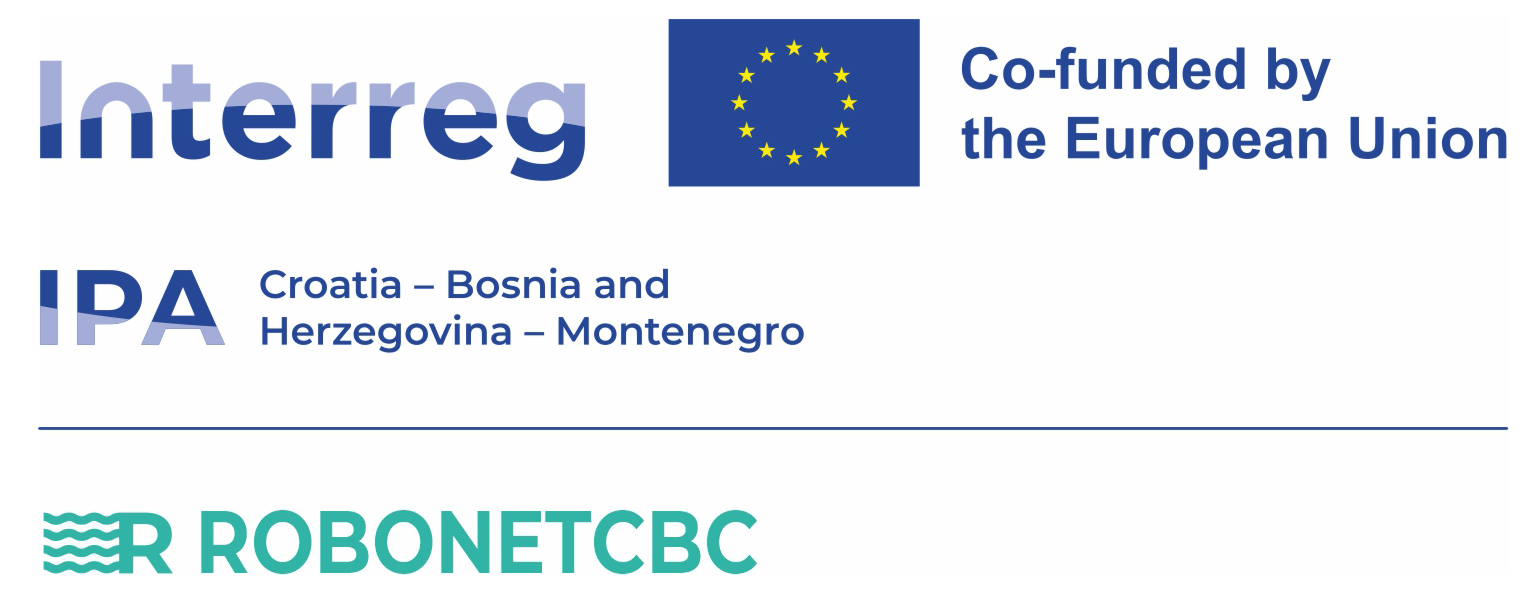NAME OF THE PROJECT: ROBONETCBC - Developing innovation network for uptake of solutions in robotics and sensors to improve monitoring and prevention of pollution of freshwater and sea ecosystems
PROGRAMME: Interreg VI-A IPA Programme Croatia - Bosnia and Herzegovina - Montenegro
TOTAL PROJECT BUDGET: 1.216.645,72 EUR
FUNDING RATE: 85%
PROJECT IMPLEMENTATION PERIOD: 1/10/2024. – 31/3/2027.
The aim of the ROBONETCBC project is to promote and improve the innovative application of blue technologies to monitor and prevent pollution in marine and freshwater ecosystems in order to ensure the sustainable management and use of these ecosystems. The project aims to foster collaboration between different stakeholders to develop new solutions within the blue economy and adopt existing innovative practices to improve monitoring methods in the participating countries.
Why is ROBONETCBC important?
The ROBONETCBC project addresses key challenges in the areas of environmental protection, sustainable development and innovation. The project focuses on the protection of marine and freshwater ecosystems and integrates advanced monitoring technologies such as robotics and sensors to prevent pollution and ensure the sustainable use of natural resources. This approach is crucial for the conservation of biodiversity and ecosystem health, which are the basis for ecological and economic well-being.
Through a comprehensive analysis of existing monitoring systems, the project will identify their strengths and weaknesses and create opportunities for improvement and optimization. By using cutting-edge technologies, the project improves the quality and efficiency of monitoring processes and enables a timely response to environmental threats. This promotes a deeper understanding of ecological dynamics and supports evidence-based decision-making for sustainable resource management.
ROBONETCBC underlines the transformative potential of innovative technologies in tackling environmental challenges. The integration of robots and sensors facilitates real-time data collection and analysis, providing invaluable insights into ecosystem state of ecosystems. These technological innovations not only improve existing practices but also introduce new paradigms in environmental management, contributing to the development of the wider blue economy.
The project also underlines the importance of cross-border cooperation between Croatia, Bosnia and Herzegovina and Montenegro. By promoting the exchange of knowledge, know-how and resources, regional cooperation in tackling common environmental problems is strengthened. This collaborative framework is crucial for tackling cross-border challenges such as pollution and climate change and promoting sustainable development in the region.
Furthermore, ROBONETCBC is in line with global efforts to mitigate the effects of climate change. By identifying and addressing risks such as sea level rise, pollution and biodiversity loss, the project strengthens the resilience of ecosystems and communities. This proactive approach not only protects natural resources, but also promotes long-term economic stability and growth.
In addition to its technological and environmental contributions, the project places great emphasis on raising awareness and building capacity among stakeholders. By involving scientific institutions, policy makers and local communities, it promotes a culture of sustainability and innovation. This educational component ensures that the results of the project have a lasting impact and bring about further progress in environmental management.
Project objectives
The objectives of the ROBONETCBC project encompass several key aspects aimed at sustainable management and protection of marine and freshwater ecosystems through the application of innovative blue technologies. The first objective is to improve the existing monitoring systems in the participating countries by identifying their weaknesses and opportunities for improvement to enable more accurate and efficient data collection on ecosystem state of ecosystems.
The second objective is to develop new, advanced monitoring technologies such as robotics, autonomous underwater vehicles (AUVs), sensors and other blue technologies to enable timely detection and mitigation of negative environmental impacts.
The third objective focuses on strengthening cooperation between relevant stakeholders, including scientific institutions, public authorities and industry actors, to develop joint strategies and solutions for protecting ecosystems, promoting the blue economy and reducing pollution.
The fourth objective is to promote the development of innovative blue economy solutions that contribute to the sustainable use of marine and freshwater resources and increase the competitiveness of small and medium-sized enterprises (SMEs) in the region.
In addition, the project aims to raise awareness of the importance of preserving ecosystems and reducing the impact of climate change through education and community involvement in monitoring and conservation activities.
Finally, the project aims to contribute to the development of sustainable business models and technologies that can improve the region's ecological resilience and ensure its sustainable economic development in the long term.
Main ROBONETCBC outputs are:
- Development of a methodological framework for assessing and monitoring the quality of marine and freshwater ecosystems using multi-criteria GIS analysis and machine learning.
- Joint action plan for the collection and processing of data for ecosystem management and use.
- Development, testing and implementation of unique ecosystem monitoring solutions.
- Guidelines for the application of ecosystem quality assessment and monitoring techniques taking into account climate change.
- Public education and training for authorized institutions responsible for ecosystem monitoring and control.
ROBONETCBC is a comprehensive and visionary initiative that combines advanced technologies, regional cooperation and capacity building to address key environmental and economic challenges. Its focus on innovation, sustainability and resilience creates a solid foundation for the long-term conservation and sustainable development of marine and freshwater ecosystems in the region.

 ROBONETCBC
About the project
ROBONETCBC
About the project

